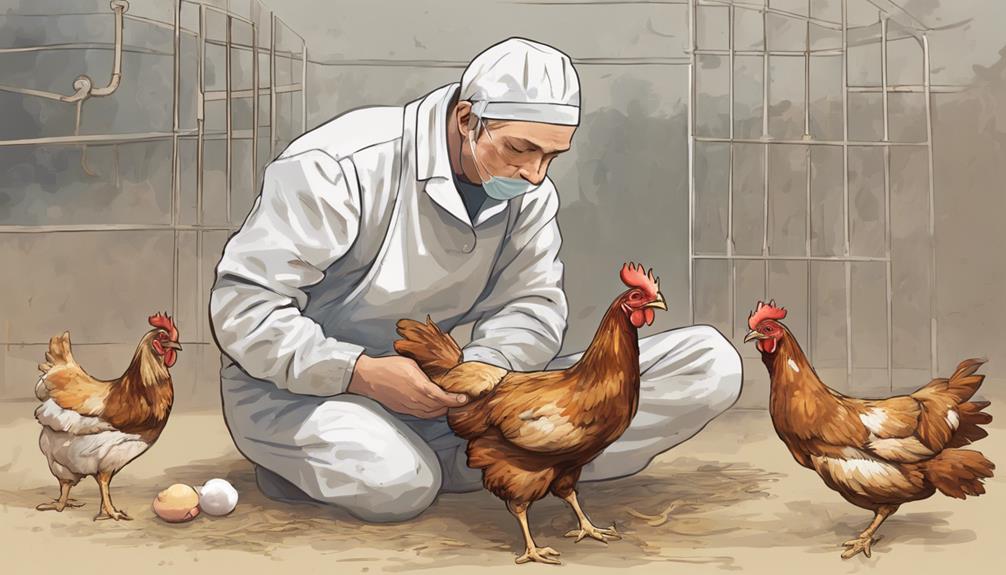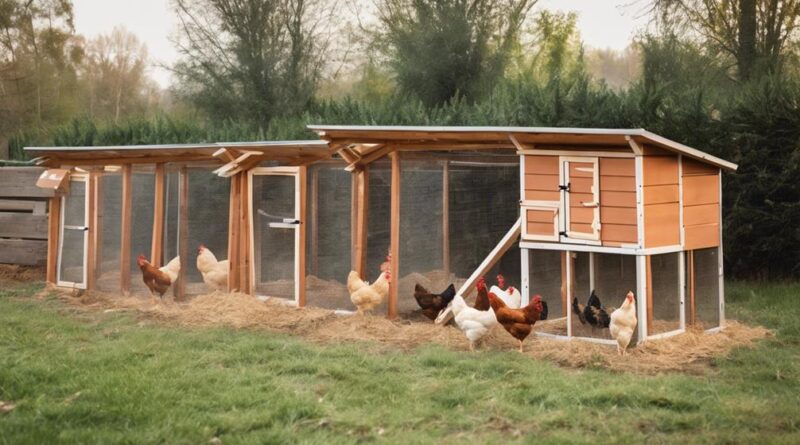Implementing Humane Practices in Chicken Farming: A Guide"
When caring for chickens on the farm, remember their welfare is paramount. Prioritize ethical standards by providing proper ventilation, clean housing, and a balanced diet. Regular veterinary care, stress-free transportation, and enriching environments contribute to their well-being. Humane euthanasia methods and respectful slaughter techniques are essential for compassionate farming practices. Compliance with guidelines through audits, staff training, and technology ensures high standards. Implementing these humane practices not only benefits the chickens' health and happiness but also reflects your commitment to responsible animal care. Embrace these principles to elevate your chicken farming practices.
Chicken Welfare Standards
How can we ensure that chicken welfare standards are met in every aspect of farming practices? Ensuring the well-being of chickens involves a deep understanding of their behavior and ethical considerations. Behavior analysis plays a crucial role in establishing humane practices in chicken farming. By observing how chickens interact with each other, their environment, and humans, farmers can tailor their practices to promote positive welfare outcomes. For instance, providing enrichments like perches and pecking objects can help reduce stress and encourage natural behaviors, ultimately improving the overall welfare of the chickens.
Ethical considerations are paramount when setting welfare standards for chickens. It's essential to treat chickens with respect and dignity, acknowledging that they're sentient beings capable of experiencing pain and pleasure. This perspective should guide every decision made on the farm, from handling procedures to housing conditions. Farmers must constantly evaluate their practices to ensure that they align with ethical principles and prioritize the welfare of the chickens above all else.
Housing and Space Requirements
When considering housing and space requirements for chickens, prioritize providing adequate room for their natural behaviors and movements. Chickens need space to roam, perch, dust bathe, and exhibit other natural behaviors essential to their well-being. Here are some key factors to consider:
- Ventilation Systems: Proper ventilation is crucial in chicken housing to maintain good air quality and regulate temperature. Ample airflow helps prevent respiratory issues and keeps the chickens healthy.
- Waste Management: Effective waste management systems are necessary to maintain cleanliness and prevent the build-up of harmful bacteria. Regular removal of droppings and soiled bedding is vital for the chickens' health.
- Natural Lighting: Access to natural light is essential for chickens' circadian rhythms and overall well-being. Ensure the housing has adequate natural lighting or appropriate artificial lighting to mimic natural day-night cycles.
- Flooring Materials: The flooring in chicken housing should be chosen carefully. Consider using materials like straw, wood shavings, or sand that are comfortable for chickens to walk on and easy to clean.
Feeding and Watering Practices
To ensure the health and well-being of your chickens, implementing proper feeding and watering practices is essential. When it comes to feeding, focus on feeding efficiency and maintaining a nutritional balance. Providing your chickens with a balanced diet rich in essential nutrients like protein, vitamins, and minerals is crucial for their growth and overall health. Consider consulting a poultry nutritionist to create a diet tailored to your flock's specific needs.
In addition to feeding, ensuring access to clean water is equally important. The quality of water directly impacts your chickens' hydration levels and overall health. Regularly check water sources to guarantee they're free from contaminants and debris. Chickens require constant access to fresh, clean water to stay hydrated, especially during hot weather or periods of high egg production.
Consider implementing automatic waterers to ensure a steady supply of water throughout the day. Monitor water consumption levels to detect any changes that could indicate health issues. Remember, proper hydration is vital for egg production, digestion, and regulating body temperature in chickens.
Health and Veterinary Care
Ensuring the health and well-being of your chickens requires proactive management of their health through proper veterinary care practices. Here are some essential tips to help you maintain a healthy flock:
- Preventive Medicine: Regularly consult with a poultry veterinarian to establish a comprehensive preventive health plan for your chickens. This plan should include routine check-ups, vaccinations, and screenings to detect and prevent any potential health issues before they become serious.
- Disease Management: Stay informed about common poultry diseases and their symptoms. Implement biosecurity measures on your farm to prevent the introduction and spread of diseases. Promptly isolate any sick chickens to minimize the risk of disease transmission within the flock.
- Vaccination Schedules: Work with your veterinarian to develop a vaccination schedule tailored to your flock's specific needs. Vaccinations play a crucial role in protecting your chickens from contagious diseases, boosting their immune system, and promoting overall health.
- Parasite Control: Regularly inspect your chickens for signs of parasites such as mites, lice, and worms. Use appropriate veterinary-recommended treatments to control and prevent parasite infestations, ensuring your chickens remain healthy and comfortable.
Handling and Transportation Guidelines
Implementing proper handling and transportation guidelines is vital to ensure the welfare and safety of your chickens throughout their journey. Stress reduction plays a crucial role in maintaining the health of your poultry. When handling chickens, it's essential to do so calmly and gently, minimizing any sudden movements or loud noises that could startle them. By providing a calm environment, you can reduce their stress levels and create a safer experience for both the birds and the handlers.
Proper ventilation is another key aspect to consider during transportation. Adequate airflow helps regulate temperature and prevent the buildup of harmful gases such as ammonia. Make sure the crates or containers used for transportation have sufficient ventilation holes to allow for proper air circulation. Additionally, avoid overcrowding the chickens during transportation to prevent them from overheating and ensure they've enough space to move comfortably.
During loading and unloading, handle the chickens carefully to prevent injuries. Use appropriate equipment, such as ramps, to facilitate the process and minimize stress on the birds. Regularly inspect and maintain transportation vehicles to guarantee they're clean, well-ventilated, and in good working condition. By following these handling and transportation guidelines, you can promote the well-being of your chickens and contribute to a more humane farming practice.
Environmental Enrichment Strategies
Consider incorporating various environmental enrichment strategies to enhance the well-being and behavior of your chickens on the farm. By implementing these strategies, you can create a more stimulating and fulfilling environment for your poultry friends. Here are some key ways to enrich the living conditions of your chickens:
- Behavioral Stimulation: Provide natural materials like straw, hay, or wood shavings for pecking and scratching. This encourages natural behaviors and reduces stress levels in the flock.
- Social Interaction: Encourage flock dynamics by ensuring an appropriate space per bird ratio. Chickens are social animals and thrive in environments where they can interact with each other freely.
- Varied Environments: Create different zones within the coop or run by using perches, platforms, or hiding spots. This diversity adds interest to their surroundings and promotes exploration.
- Toys and Puzzles: Introduce hanging vegetables, treat balls, or mirrors to keep your chickens mentally engaged. These enrichments can prevent boredom and improve overall welfare.
Slaughter and Euthanasia Protocols

Establishing humane slaughter and euthanasia protocols is crucial for maintaining the welfare and ethical treatment of chickens on the farm. When it comes to euthanizing chickens, using humane euthanasia methods is essential. Methods such as cervical dislocation, penetrating captive bolt, or gas inhalation with appropriate agents like carbon dioxide are considered humane and should be conducted with care and expertise to minimize distress.
In terms of slaughter techniques, it's important to ensure that chickens are handled calmly and with respect throughout the process. Utilizing methods that minimize suffering, such as electrical stunning before slaughter, can help in achieving a more humane approach. The use of sharp knives to ensure swift and effective slaughter is also crucial for ethical treatment.
Implementing these humane practices not only aligns with ethical standards but also contributes to the overall well-being of the chickens on the farm. By prioritizing humane euthanasia methods and slaughter techniques, you're actively promoting a culture of compassion and responsibility towards the animals in your care. Remember, every step taken towards ensuring the welfare of chickens reflects your commitment to upholding humane practices in chicken farming.
Compliance and Monitoring Procedures
Adhering to stringent compliance and monitoring procedures is fundamental to ensuring the ethical and humane treatment of chickens on the farm. As a responsible chicken farmer, you must implement robust systems to uphold compliance standards and closely monitor the well-being of your flock. Here are essential steps to guide you in maintaining high standards of care:
- Regular Audits: Conduct routine audits to assess compliance with ethical guidelines and regulatory standards. These audits should cover aspects such as housing conditions, access to food and water, and overall bird health.
- Training Programs: Provide ongoing training for farm staff on proper chicken handling, welfare practices, and the importance of adherence to compliance standards. Well-trained staff are crucial in upholding humane treatment protocols.
- Record-Keeping: Maintain detailed records of veterinary visits, medication administration, and any deviations from standard procedures. These records are vital for monitoring the health and well-being of your chickens.
- Use of Technology: Implement technological solutions such as sensors for temperature monitoring, automated feeders, and cameras for real-time surveillance. Technology can enhance monitoring procedures and help detect issues promptly.
Frequently Asked Questions
Can Chickens Raised in Humane Conditions Produce Better Quality Eggs?
Chickens raised in humane conditions can indeed produce better quality eggs. When cared for ethically and with enhanced nutrition, chickens are healthier, happier, and lay eggs that reflect their well-being.
How Often Should Chickens Be Given Access to Outdoor Spaces?
To ensure your chickens' well-being, aim for daily outdoor activity. Access to outdoor spaces is vital for their health and happiness. Regular sunlight exposure provides essential vitamins and mental stimulation.
Make sure they have room to roam, scratch, and explore. This practice not only benefits your chickens but also contributes to better egg quality. Prioritize their access to the outdoors for optimal physical and mental health.
What Is the Impact of Stress on Chicken Well-Being?
When chickens experience stress, their well-being is significantly impacted. Stress can lead to decreased egg production, compromised immune systems, and aggressive behavior.
It's crucial to minimize stressors in their environment to ensure healthier and happier chickens. Providing adequate space, proper nutrition, and a calm atmosphere can help alleviate stress and promote overall well-being in your flock.
Regular monitoring and addressing any potential sources of stress are essential for maintaining the health of your chickens.
Are There Specific Regulations for Chicken Welfare During Transportation?
During chicken transportation, specific regulations exist to ensure welfare standards are met. Transport conditions must adhere to set guidelines to minimize stress and discomfort for the animals.
Enforcement of these regulations is crucial for maintaining the well-being of the chickens during transit. It's essential to prioritize their care and safety throughout the transportation process to promote humane practices in the industry.
Do Humane Practices in Chicken Farming Affect Consumer Perception?
When it comes to consumer trust and ethical sourcing, humane practices in chicken farming play a crucial role. Consumers are increasingly concerned about how animals are treated in the food industry.
Implementing humane practices not only ensures better welfare for the chickens but also positively impacts consumer perception. By prioritizing ethical treatment of animals, you can build trust with consumers who value transparency and sustainability in the products they purchase.
Conclusion
In conclusion, implementing humane practices in chicken farming is crucial for the well-being of the birds and the sustainability of the industry.
By following welfare standards, providing adequate housing and space, ensuring proper nutrition and healthcare, handling birds with care, and monitoring compliance, you can make a positive impact on the lives of the chickens in your care.
Remember, every small change you make can make a big difference in the lives of these animals.
